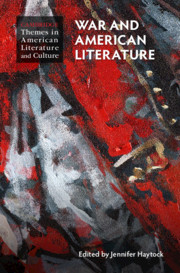Book contents
- War and American Literature
- Cambridge Themes in American Literature and Culture
- War and American Literature
- Copyright page
- Contents
- Contributors
- Acknowledgments
- Chronology
- Introduction
- Part I Aspects of War in American Literature
- Part II Cultural Moments and the American Literary Imagination
- Part III New Lines of Inquiry
- Chapter 18 War and Queerness
- Chapter 19 War and Disability Studies
- Chapter 20 War and Ecocriticism
- Chapter 21 War and Whiteness
- Chapter 22 War and Posthumanism
- Further Reading
- Index
Chapter 20 - War and Ecocriticism
from Part III - New Lines of Inquiry
Published online by Cambridge University Press: 20 January 2021
- War and American Literature
- Cambridge Themes in American Literature and Culture
- War and American Literature
- Copyright page
- Contents
- Contributors
- Acknowledgments
- Chronology
- Introduction
- Part I Aspects of War in American Literature
- Part II Cultural Moments and the American Literary Imagination
- Part III New Lines of Inquiry
- Chapter 18 War and Queerness
- Chapter 19 War and Disability Studies
- Chapter 20 War and Ecocriticism
- Chapter 21 War and Whiteness
- Chapter 22 War and Posthumanism
- Further Reading
- Index
Summary
This essay links the environmental resistance embodied by Edward Abbey’s Hayduke in The Monkey Wrench Gang after the Vietnam War and the speculatively fictional future of Octavia Butler’s Olamina’s ecofeminist resistance (The Parable of the Talents) to a war that seems all too imminent in the contemporary US, a place where climate change denial is political policy and the interests of fossil fuel magnates matter more than the lives of individual citizens. This essay explores how American ecocriticism interrogates and informs our conceptions of war, whom we are fighting, and the ways that war generates environmental exigency.
- Type
- Chapter
- Information
- War and American Literature , pp. 301 - 314Publisher: Cambridge University PressPrint publication year: 2021

